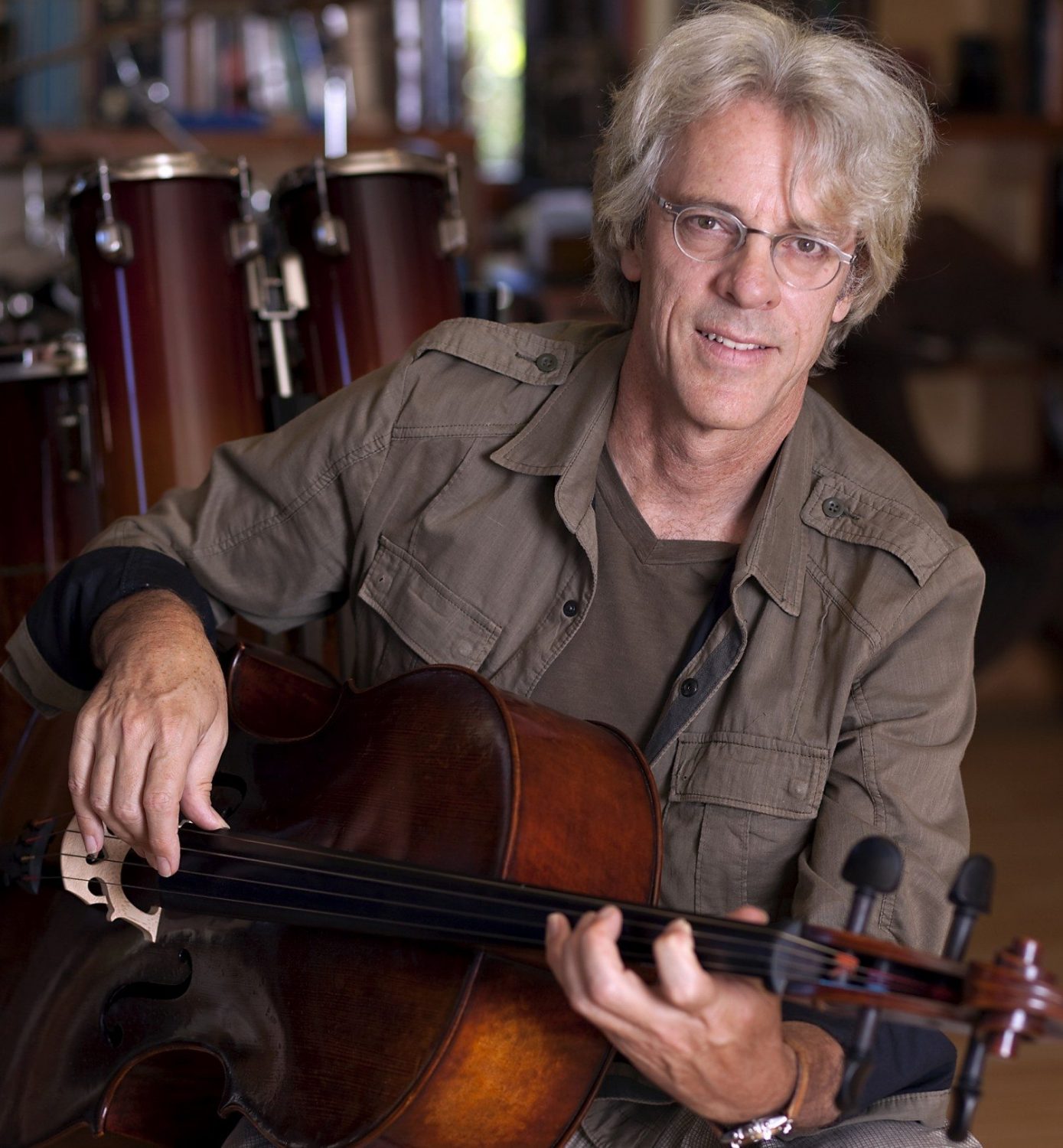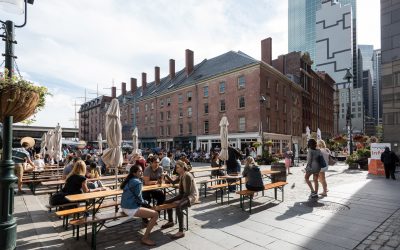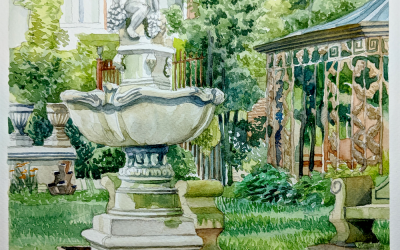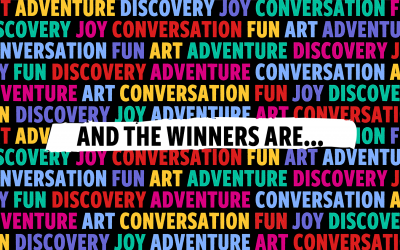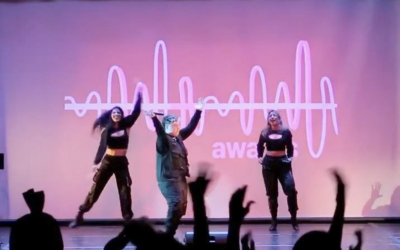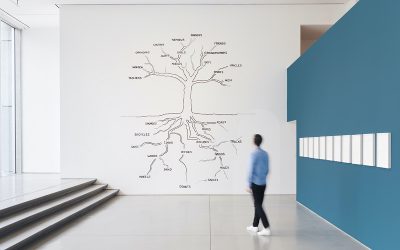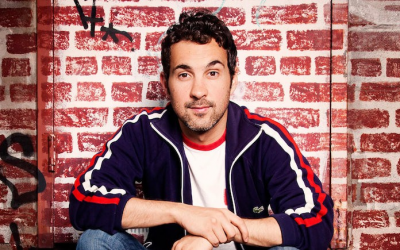Stewart Copeland is a busy guy.
When Downtown spoke to Copeland in late March, he’d just gotten off a 3-hour conference call, score-doctoring his Adolfo Bioy Casares-inspired opera, The Invention of Morel.
This same conversation was squeezed onto his calendar between two weeks on the road supporting his rock/jazz/chamber music quintet Off the Score and four West Coast dates performing his live score to the 1925 silent film Ben Hur: A Tale of the Christ. This followed hot on the heels of his debuted percussive concerto The Tyrant’s Crush, which took place not long after debuting new orchestrations for his Edgar Allen Poe-inspired opera The Cask of Amontillado at Dixon Place, which happened simultaneously with a New Opera Showcase workshop of Morel at Trinity Church.
Copeland has spent the last 30 years composing music for orchestra, film, TV, opera and ballet. He’s also a world-renowned drummer, an inductee in the Rock and Roll Hall of Fame, and a five-time Grammy-winner with the ‘80s band that originally made him famous, The Police.
It’s tempting to assume there are two Stewart Copelands: professional orchestral composer and performer by day, jamming rock star by night. But the two are really one and the same. Copeland is that rare bird of rockstar in a classical world, a wide, wild fury of flailing arms, eye teeth, polyrhythms and flying drumsticks infiltrating the lush, regimented tradition of the symphony. Copeland is the guy that brings a trashcan to a concerto.
On April 8 at the Schimmel Center at Pace University‘s downtown campus, Copeland’s Off the Score quintet brings him together with famed classical pianist Jon Kimura Parker, Metropolitan Opera Orchestra violinist Yoon Kwon, classical/jazz double bassist Marlon Martinez and electronic valve instrumentalist Judd Miller for the final night of their spring tour. Program selections may include classical standards, Copeland originals, a modern interpretation of The Police and possibly Aphex Twin. A genre-bending hybrid of charted music and jam session, Off the Score illustrates well how orchestral Copeland never strays too far from his rock roots.
Downtown spoke with Copeland about this upcoming performance, the tension between art and commerce, Snoop Dogg and flouting expectation. He also gave us a tiny glimpse into what to expect next from him.
Your career is diverse and really complicated to describe. When you’re meeting someone for the first time, how do you introduce yourself?
Stewart Copeland: Father of seven. I guess “composer” is my day job right now. I still rock and roll [in the] evening for relaxation and recreation. But my day job is writing music for others to play.
How do you describe that type of music?
SC: That’s a thorny question. Many are tempted to use the word “classical” because it involves an orchestra. But it’s not classical on two grounds. One is that, to be really pedantic about it, it’s not classical unless it was written in the 19th century. And the other thing is, I’m not a continuation of Mendelssohn and Brahms. I come from Jimi Hendrix, and certainly Stravinsky too, but from a very different musical world. I’m not following in the footsteps of the great orchestral masters. I am looking for ways to use this mighty instrument the symphony orchestra for a fresh purpose.
How would you describe that fresh purpose then?
SC: Well, it has all the sensibilities of all the other music that I’ve been making for fifty years.
When you’re composing for orchestra, do you have to fight the rock/pop instincts?
SC: Not at all. I delve deep into that instinct. Everything that I’ve learned about how you turn on a stadium, I’m trying to apply—not always with full success, but that’s my intention—to apply that atmosphere to the orchestral stage. Now there’s a wrinkle to all of this, which is that the physical reality of this world is a classical world. Those orchestras are set up to perform the great classical works. The funding for all of that comes from patrons of classical music, not of rock and roll necessarily. The other items on the bill are going to be Shostakovich or Ravel or a classical piece, so I have to be able to work in that world as well. But that’s not my intention. It’s sort of like a flag of convenience in the same way that cutting my hair and peroxiding it [for The Police] was a flag of convenience. —That’s great, isn’t it? Forty years ago, or however long ago, I pretended to be a punk rocker so that I could get a gig at the Roxy Club. Now I’m pretending to be Mozart so I can get a gig at the symphony hall.
It’s rare for a composer to come in and say “I’m a former rock/pop star and I’m going to write an orchestral piece for trap set, half a dozen percussive instruments, and maybe even a trash can.” How do you convince those classical bigwigs to invest in your work?
SC: I’ve been at it for quite a few decades now, slowly, slowly, slowly clawing my way up into their consciousness. Some of the more adventurous artistic directors at these fine-arts organizations have taken a punt. Sometimes it’s worked out well for them. Sometimes not as well. In Pittsburgh they commissioned a big piece for Stewdaddy and Orcs [concerto “The Tyrant’s Crush”], and it made a big noise in the room. The classical critics looked askance somewhat. But the symphony people—the folks that make the decisions for what the symphony’s going to do—they were well pleased. They saw a full house with people really enthusiastic. They understand that they may have crossed some lines there, maybe some of their sponsors there said, “Wait a minute. We bought our season tickets so that we could see Mendelssohn. Who’s this living composer?”
That’s the struggle that the orchestras all face. It’s that they have to do something new. They have to bring in new talent. They have to move the ball down the field without losing their patrons who just want to hear Mendelssohn. Their patrons don’t necessarily feel the need to be educated in the same way that the orchestra feels the need to educate its community. So there’s that tension there.
That’s an interesting dichotomy that you have to deal with. You’ve got the people talking to the audience in a different language than the audience wants to hear it.
SC: Well, some of the audience. But it has been working out pretty well. Stodgy old Royal Liverpool Philharmonic—that is a really old-school orchestra. The patrons are very old-school. Very old, period. They’re not gray-haired, they’re white-haired and in Zimmer frames. My little piece “Poltroons in Paradise” went up there—they commissioned it—and it was up against the titans, the giants of British composing. Elgar, Britten, Walton. And the old folks—admittedly, it did have three percussionists going ape-crazy, which is always good fun—but it did very well. So it does hopefully still appeal to those aficionados of classical music, but that’s not who I’m writing for. Necessarily.
How would you describe the person you’re writing for, then?
Well, you. People who give a shit about what it is that I’m doing. If my name was Elton John, my musical proclivities would take me in a direction that made really successful commercial pop songs. But my tastes don’t run that direction, and all I can do is follow my own instincts, which take me down into places where there may be a smaller audience, but a worthy audience, nonetheless.
You’re coming to New York for Off the Score, which is billed as “an evening of chamber music for a new generation.”
SC: Yiiee, that’s a buzzkill. People should stay at home in droves.
Right? How would you describe Off the Score to someone who’s never heard it?
SC: A wild exploration of the furthest reaches of musical consciousness!
I’m not sure that’s much different.
SC: Well, I’d go see that.
You and John Kimura Parker tend to make the headlines, but what can you tell me about the rest of the Off the Score quintet?
SC: Marlon Martinez is a young prodigy. He just graduated from Colburn and was suggested to me by Stanley Clarke. And, jeez, Stanley’s gonna regret that. One of these days, that kid is gonna eat his lunch. He’s not there yet, but this kid has got the gift. He’s got it all. He can read batshit [music notation] on the page, and he’s an improviser. He is a bit steeped in jazz, but I’m working on that.
Young Ms. Kwon, first violin with the Met. Very fancy, very sophisticated. Chops beyond anything that I’ve ever dealt with outside of the classical world. [And] John Kimura Parker, by the way. I’ve worked with the triple-scale alpha dogs here in Los Angeles. None of them are even close to the chops of a top-rated pro piano soloist like John Kimura Parker. The stuff that he can do is stuff you don’t get in rock and roll. Ms. Kwon has those chops, too, on her violin. She brings that. For both of those two players, the leap off the cliff into improvisation is a very big deal. And because it’s such a terrifying leap for them, that makes it very exciting for the rest of us who jam every day. There’s an urgency, a drama that is exciting.
Last but not least is Judd Miller on the EVI. He’s the guy, that not only I, but every other composer in Los Angeles has been using for decades. He blows into this instrument and creates MIDI data, like as if you entered notes on a piano. But he does it with breath, so it’s very fluid. Very human and visceral. He can do a mean bassoon, or trumpet, or trombone, or bass trombone or tuba. But he also has sounds that are nothing you ever heard before. Drones and weird vocalizations. Really cool stuff. Plus, he can read batshit. Flick your fountain pen at a page of music, and he can read it and play it. He’s a great soloist. When he takes a solo, it’s gonna have heart. It’s gonna take flight. His is the most bizarre instrument that takes the most explaining of the five of us, but it’s a really interesting element to the band.
For more than thirty years now, you’ve worked or played with just about everyone at one time or another. Who would you say was the most surprising, and why?
SC: Snoop Dogg was pretty darn surprising. He came in here [to the Sacred Grove, Copeland’s studio] and picked up almost every instrument in the room and kept saying, “Nobody ever lets me do this.” I mean, fuck, Snoop, you’re fucking seven feet tall. Who’s going to stop you? He picks up the trumpet, and he’s never handled one before, but he gets something cool going with it. He gets on the drums. Nobody’d ever let him sit on the drums before, but he’s banging away. He has no idea what he’s doing, but it’s cool. His X-factor, applied even to an instrument that he’s unfamiliar with, it’s still an X-factor.
You made it big at a lucrative time for musicians, but many of those mechanisms that made bands rich in the ‘80s are now defunct. How do you feel about the current climate for making music—or more importantly, making money in music?
SC: That’s a very important distinction. Making music is easier than it has ever been. That’s a good thing. Making money from it is harder. That’s a bad thing. On a base level, musicians can still get work. There are still clubs that hire live bands—mostly to play covers, but you can still earn a living as a musician. As an artist, that’s much trickier, and I really don’t know how you do it these days. Just getting heard is a reward enough these days. Getting income from that recording is no longer part of the dream. It has become where the recorded music is merely an advertisement for the merch. By the way, this is not necessarily a bad thing. Because what it means in practice is that the music is for free.
Recently Wall Street Journal music critic Jim Fusilli wrote a book for the pre-millennial generations, encouraging them to engage with, rather than be scared by, 21st-century music. His basic premise is that the recording industry hates people age 40 and up.
SC: That’s weird because the recording industry is staffed by people 40 and up. I have a huge respect for people like… uh… Shit, my mind’s gone blank. The asshole…married to a pop star or a Kardashian…
Oh, Kanye West.
SC: Yeah, Kanye. He may be an asshole, but fuck, him and the Black-Eyed Peas and others have finally escaped from the straightjacket of guitar, bass, and drums. E-, A-, and D-chords, backbeat—all these things that went all the way from Bill Haley, through The Beatles and The Stones, through Hendrix and Cream, through the ‘70s and ‘80s—whatever you call that—through punk rock. The Sex Pistols were playing the same instruments, the same chords as Bill Haley and the Comets! For decade after decade after decade. Finally these guys come along who don’t have a backbeat. They don’t have any guitar anywhere on the record. In fact, you’re not even sure where One is. The sixteenth notes are juxtaposed against triplets in a fucked-up kind of way that just works.
I’m not in competition with these guys, so maybe I can be more sanguine about it. And I only learned of it through my sixteen-year-old daughter. But I think music’s headed in a really interesting direction. That part we were talking about earlier, where making music is easier—that’s got to make the art better. It’s not only musicians who can get a record deal and get into a recording studio who can express themselves. It’s everybody. Which means that that’s a wider talent pool.
So what’s next? The Invention of Morel debuts in Chicago in 2017. But you’ve said you still have a few tricks up your sleeve. So what cards are you hiding?
SC: Um… Still hidden.
Can you give us any hints?
SC: TV. And that’s as much as I can utter. But I did have another meeting. Ballet is another really cool medium that has got me really fired up. And, in fact, David Bamberger, who wrote the libretto of The Cask of Amontillado—he has come up with a way of doing a wraparound about Poe himself to connect those other two pieces [Cask and Copeland’s other Poe-inspired short opera, The Tell Tale Heart]. I’ve got that in the cookie jar, waiting to get into.
*This interview has been edited and condensed for clarity and length.
-by Kellie M. Walsh

